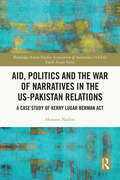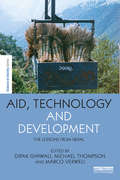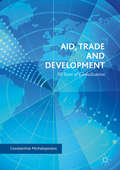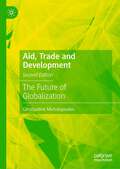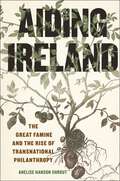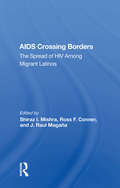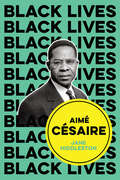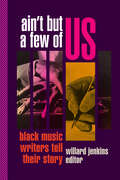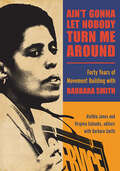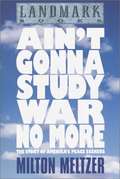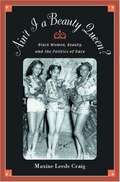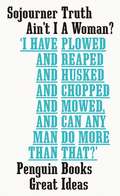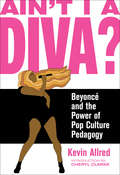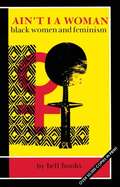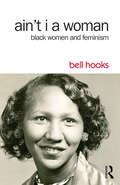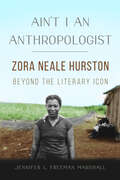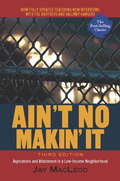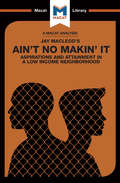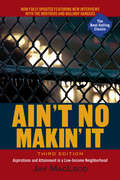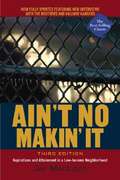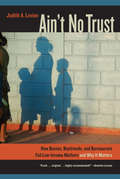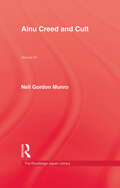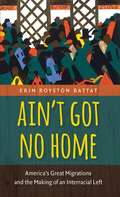- Table View
- List View
Aid, Politics and the War of Narratives in the US-Pakistan Relations: A Case Study of Kerry Lugar Berman Act (Routledge / Asian Studies Association of Australia (ASAA) South Asian Series)
by Hussain NadimThis book analyses the aid, politics and the war of narratives between the US and Pakistan under the Kerry Lugar Berman Act (2009–2013), using the security-development nexus as a framing discourse and taking a decolonial approach to the subject. The book explores the politics of US foreign aid to Pakistan, with regard to the issues of ‘sovereignty’ and ‘agency’, to analyse the notions of aid, power and narratives in the asymmetrical US-Pakistan relations. Based on primary interviews and extensive data analysis of US foreign aid datasets, the book specifically argues that foreign aid is based under the hubris of the security-development nexus, which encourages a dialectical power struggle between the US and Pakistan, and between the civil and military actors inside Pakistan, which use the indivisibility of security and development to advance their strategic interests over each other. This book is a timely analysis given the recent political turmoil in Pakistan that saw the ouster of Prime Minister Imran Khan who blamed the Biden Administration for orchestrating a “regime change” conspiracy against his government. Interdisciplinary and relevant to academic and policy debates, this book will be of interest to researchers in the fields of Development Studies, International Relations, Policy Studies, Area Studies and, in particular, South Asian Politics.
Aid, Technology and Development: The Lessons from Nepal (The Earthscan Science in Society Series)
by Dipak Gyawali, Michael Thompson and Marco VerweijOver the last 50 years, Nepal has been considered an experiential model in determining the effectiveness and success of global human development strategies, both in theory and in practice. As such, it provides a rich array of in-depth case studies in both development success and failure. This edited collection examines these in order to propose a novel perspective on how human development occurs and how it can be aided and sustained. Aid, Technology and Development: The lessons from Nepal champions plural rationality from both a theoretical and practical perspective in order to challenge and critique the status quo in human development understanding, while simultaneously presenting a concrete framework with which to aid citizen and governmental organisations in the galvanization of human development. Including contributions by leading international social scientists and development practitioners throughout Nepal, this book will be of great interest to students, scholars and practitioners working in the field of foreign aid and development studies.
Aid, Trade and Development: 50 Years of Globalization
by Constantine MichalopoulosThis enlightening book offers a comprehensive historical analysis of the main development challenges of the last half century and the international community's response through aid and trade. Much has happened: the oil crises of the 1970s, the debt crises of the 1980s, the break-up of the Soviet Union in the 1990s, the Millennium Development Goals, the onslaught of Globalization and the rise of its opponents since the financial crisis of the 2000s. Through it all, development has spread and global poverty declined. The volume assesses the contributions and coherence of developing and developed country policies and the role played by global institutions entrusted with responsibilities to enhance trade and support development. The volume concludes with a focus on the prospects for the future and the changes needed to make globalization more equitable. With 50 years of professional experience in the World Bank, the WTO and bilateral aid agencies, Michalopoulos brings an insider's perspective on the workings of these institutions and what needs to be done to make them more effective and responsive to changing global needs.
Aid, Trade and Development: The Future of Globalization
by Constantine MichalopoulosThis volume presents a broad sweep of modern economic history underpinning aid, trade, development and globalization in the last half century and the salient challenges facing the global community today. The author draws on his long years as an academic and development practitioner to recommend what needs to be done to cope with the backsliding of the fight against global poverty, fractured geopolitics and the threats to the multilateral economic order. The new, revised edition analyses how unilateralism, rising protectionism and the Covid-19 pandemic seriously threaten global sustainable development. It concludes with recommendations on the policy changes needed to make globalization more equitable and development more sustainable. This book will be of interest to researchers and students of economic development and economic history, as well as all those concerned about global inequality and sustainability.
Aiding Ireland: The Great Famine and the Rise of Transnational Philanthropy (The Glucksman Irish Diaspora Series)
by Anelise Hanson ShroutLooks at the ways that disparate groups used Irish famine relief in the 1840s to advance their own political agendasFamine brought ruin to the Irish countryside in the nineteenth century. In response, people around the world and from myriad social, ethnic, and religious backgrounds became involved in Irish famine relief. They included enslaved Black people in Virginia, poor tenant farmers in rural New York, and members of the Cherokee and Choctaw nations, as well as plantation owners in the US south, abolitionists in Pennsylvania, and, politicians in England and Ireland. Most of these people had no personal connection to Ireland. For many, the famine was their first time participating in distant philanthropy.Aiding Ireland investigates the Irish famine as a foundational moment for normalizing international giving. Anelise Hanson Shrout argues that these diverse men and women found famine relief to be politically useful. Shrout takes readers from Ireland to Britain, across the Atlantic to the United States, and across the Mississippi to Indian Territory, uncovering what was to be gained for each group by participating in global famine relief. Aiding Ireland demonstrates that international philanthropy and aid are never simple, and are always intertwined with politics both at home and abroad.
Aids Crossing Borders: The Spread Of Hiv Among Migrant Latinos
by Ross F. Conner Shiraz I. Mishra J. Raul MagañaAIDS has crossed every international border and affects all populationsthroughout the world, including migrant workers. In the U.S.,migrant workers are a hidden and sometimes maligned population withlimited access to needed health and welfare services, including HIVprevention. Little, however, is krown about the impact of the HIV IAIDS epidemic oo Latino farmworkers. This absence of systematic researchwas the impetus for the preparation of this book.This book is the first collection of research studies focusing specificallym migrant Latino farmworkers. The book brings together sevenresearch studies to provide a profile of the HN prevention, surveillanceand treatment needs of migrant workers. The editors combinetheir own work with that of nationally and internationally recognizedexperts to provide a comprehensive analysis of different aspects of theHIV epidemic among migrant Latino workers. They examine issuessuch as the HN prevention needs of Latino farmworking women andtheir children, the sexual beliefs and behaviors of Latino migrantworkers, the effects of migration m changes in sexuality and sexualpractices, the risk for HN through use of sex workers, knowledge aboutthe HIV I AIDS epidemic, the effectiveness of prevention programs, andpolicies and programs that may stem the spread of HIV among thispopulation. The book is notable for including, in addition to researchers'views, the perspectives of migrant workers and policymakers mHN prevention policies and programs.
Aimé Césaire: Inventor of Souls (Black Lives)
by Jane HiddlestonAimé Césaire is arguably the greatest Caribbean literary writer in history. Best known for his incendiary epic poem Notebook of a Return to My Native Land, Césaire reinvented black culture by conceiving ‘négritude’ as a dynamic and continuous process of self-creation. In this essential new account of his life and work, Jane Hiddleston introduces readers to Césaire’s unique poetic voice and to his role as a figurehead for intellectuals pursuing freedom and equality for black people. Césaire was deeply immersed in the political life of his native Martinique for over fifty years: as Mayor of Fort-de-France and Deputy at the French National Assembly, he called for the liberation of oppressed people at home and abroad, while celebrating black creativity and self-invention to resist a history of racism. Césaire’s extraordinary life reminds us that the much-needed revolt against oppression and subjugation can—and should—come from within the establishment, as well as without.
Ain't But a Few of Us: Black Music Writers Tell Their Story
by Willard JenkinsDespite the fact that most of jazz’s major innovators and performers have been African American, the overwhelming majority of jazz journalists, critics, and authors have been and continue to be white men. No major mainstream jazz publication has ever had a black editor or publisher. Ain’t But a Few of Us presents over two dozen candid dialogues with black jazz critics and journalists ranging from Greg Tate, Farah Jasmine Griffin, and Robin D. G. Kelley to Tammy Kernodle, Ron Welburn, and John Murph. They discuss the obstacles to access for black jazz journalists, outline how they contend with the world of jazz writing dominated by white men, and point out that these racial disparities are not confined to jazz but hamper their efforts at writing about other music genres as well. Ain’t But a Few of Us also includes an anthology section, which reprints classic essays and articles from black writers and musicians such as LeRoi Jones, Archie Shepp, A. B. Spellman, and Herbie Nichols.ContributorsEric Arnold, Bridget Arnwine, Angelika Beener, Playthell Benjamin, Herb Boyd, Bill Brower, Jo Ann Cheatham, Karen Chilton, Janine Coveney, Marc Crawford, Stanley Crouch, Anthony Dean-Harris, Jordannah Elizabeth, Lofton Emenari III, Bill Francis, Barbara Gardner, Farah Jasmine Griffin, Jim Harrison, Eugene Holley Jr., Haybert Houston, Robin James, Willard Jenkins, Martin Johnson, LeRoi Jones, Robin D. G. Kelley, Tammy Kernodle, Steve Monroe, Rahsaan Clark Morris, John Murph, Herbie Nichols, Don Palmer, Bill Quinn, Guthrie P. Ramsey Jr., Ron Scott, Gene Seymour, Archie Shepp, Wayne Shorter, A. B. Spellman, Rex Stewart, Greg Tate, Billy Taylor, Greg Thomas, Robin Washington, Ron Welburn, Hollie West, K. Leander Williams, Ron Wynn
Ain't Gonna Let Nobody Turn Me Around: Forty Years of Movement Building with Barbara Smith (SUNY series in New Political Science)
by Alethia Jones; Virginia Eubanks; Barbara SmithSilver Winner, 2014 ForeWord IndieFab Book of the Year Award in the Women's Studies Category2015 Lambda Literary Award in Lesbian Memoir/Biography presented by the Lambda Literary Foundation2015 Judy Grahn Award for Lesbian Nonfiction presented by the Publishing TriangleAs an organizer, writer, publisher, scholar-activist, and elected official, Barbara Smith has played key roles in multiple social justice movements, including Civil Rights, feminism, lesbian and gay liberation, anti-racism, and Black feminism. Her four decades of grassroots activism forged collaborations that introduced the idea that oppression must be fought on a variety of fronts simultaneously, including gender, race, class, and sexuality. By combining hard-to-find historical documents with new unpublished interviews with fellow activists, this book uncovers the deep roots of today's "identity politics" and "intersectionality" and serves as an essential primer for practicing solidarity and resistance.
Ain't Gonna Study War No More: The Story of America's Peace Seekers
by Milton MeltzerA history of those who have protested war with emphasis on the United States.
Ain't I A Beauty Queen?: Black Women, Beauty, and the Politics of Race
by Maxine Leeds Craig"Black is Beautiful!" The words were the exuberant rallying cry of a generation of black women who threw away their straightening combs and adopted a proud new style they called the Afro. The Afro, as worn most famously by Angela Davis, became a veritable icon of the Sixties. Although the new beauty standards seemed to arise overnight, they actually had deep roots within black communities. Tracing her story to 1891, when a black newspaper launched a contest to find the most beautiful woman of the race, Maxine Leeds Craig documents how black women have negotiated the intersection of race, class, politics, and personal appearance in their lives. Craig takes the reader from beauty parlors in the 1940s to late night political meetings in the 1960s to demonstrate the powerful influence of social movements on the experience of daily life. With sources ranging from oral histories of Civil Rights and Black Power Movement activists and men and women who stood on the sidelines to black popular magazines and the black movement press, Ain't I a Beauty Queen'will fascinate those interested in beauty culture, gender, class, and the dynamics of race and social movements.
Ain't I A Woman? (Penguin Great Ideas)
by Sojourner Truth'I am a woman's rights. I have plowed and reaped and husked and chopped and mowed, and can any man do more than that? I am as strong as any man that is now'A former slave and one of the most powerful orators of her time, Sojourner Truth fought for the equal rights of Black women throughout her life. This selection of her impassioned speeches is accompanied by the words of other inspiring African-American female campaigners from the nineteenth century.One of twenty new books in the bestselling Penguin Great Ideas series. This new selection showcases a diverse list of thinkers who have helped shape our world today, from anarchists to stoics, feminists to prophets, satirists to Zen Buddhists.
Ain't I a Diva?: Beyoncé and the Power of Pop Culture Pedagogy
by Kevin Allred&“[Allred] interrogates Beyoncé&’s music and videos to explore the complicated spaces where racism, sexism, and capitalism collide.&” —Kirkus Reviews In 2010, Professor Kevin Allred created the university course &“Politicizing Beyoncé&” to both wide acclaim and controversy. He outlines his pedagogical philosophy in Ain&’t I a Diva?, exploring what it means to build a syllabus around a celebrity. Topics range from a capitalist critique of &“Run the World (Girls)&” to the politics of self-care found in &“Flawless&”; Beyoncé&’s art is read alongside black feminist thinkers including Kimberlé Crenshaw, Octavia Butler, and Sojourner Truth. Combining analysis with classroom anecdotes, Allred attests that pop culture is so much more than a guilty pleasure, it&’s an access point—for education, entertainment, critical inquiry, and politics.&“Proving himself a worthy member of the BeyHive, Kevin Allred takes us on a journey through Beyoncé&’s greatest hits and expansive career—peeling back their multiple layers to explore gender, race, sexuality, and power in today&’s modern world. A fun, engaging, and important read for long-time Beyoncé fans and newcomers alike.&” —Franchesca Ramsey, author of Well, That Escalated Quickly&“Ain&’t I a Diva? explores the phenomenon of Beyoncé while explicitly championing not only her immense talent and grace but what we can learn from it. In this celebration of Beyoncé, and through her, other Black women, Allred is giving us room to be exactly who we are so that maybe we, too, can stop the world then carry on!&” —Keah Brown, author of The Pretty One&“A must-read for any fan of Beyoncé and of fascinating feminist discourse.&” —Zeba Blay, senior culture writer, HuffPost
Ain't I a Woman: Black Women and Feminism
by Bell HooksAin't I a Woman examines the impact of sexism on black women during slavery, the historic devaluation of black womanhood, black male sexism, racism within the recent women's movement, and black women's involvement with feminism.
Ain't I a Woman: Black Women and Feminism
by Bell HooksA classic work of feminist scholarship, Ain't I a Woman has become a must-read for all those interested in the nature of black womanhood. Examining the impact of sexism on black women during slavery, the devaluation of black womanhood, black male sexism, racism among feminists, and the black woman's involvement with feminism, hooks attempts to move us beyond racist and sexist assumptions. The result is nothing short of groundbreaking, giving this book a critical place on every feminist scholar's bookshelf.
Ain't I an Anthropologist: Zora Neale Hurston Beyond the Literary Icon (New Black Studies Series)
by Jennifer L. Freeman MarshallIconic as a novelist and popular cultural figure, Zora Neale Hurston remains underappreciated as an anthropologist. Is it inevitable that Hurston’s literary authority should eclipse her anthropological authority? If not, what socio-cultural and institutional values and processes shape the different ways we read her work? Jennifer L. Freeman Marshall considers the polar receptions to Hurston’s two areas of achievement by examining the critical response to her work across both fields. Drawing on a wide range of readings, Freeman Marshall explores Hurston’s popular appeal as iconography, her elevation into the literary canon, her concurrent marginalization in anthropology despite her significant contributions, and her place within constructions of Black feminist literary traditions. Perceptive and original, Ain’t I an Anthropologist is an overdue reassessment of Zora Neale Hurston’s place in American cultural and intellectual life.
Ain't No Makin' It
by Jay MacleodThis classic text addresses one of the most important issues in modern social theory and policy: how social inequality is reproduced from one generation to the next. With the original 1987 publication of Ain't No Makin' It Jay MacLeod brought us to the Clarendon Heights housing project where we met the "Brothers" and the "Hallway Hangers." Their story of poverty, race, and defeatism moved readers and challenged ethnic stereotypes. MacLeod's return eight years later, and the resulting 1995 revision, revealed little improvement in the lives of these men as they struggled in the labor market and crime-ridden underground economy. The third edition of this classic ethnography of social reproduction brings the story of inequality and social mobility into today's dialogue. Now fully updated with thirteen new interviews from the original Hallway Hangers and Brothers, as well as new theoretical analysis and comparison to the original conclusions, Ain't No Makin' It remains an admired and invaluable text. Contents Part One: The Hallway Hangers and the Brothers as Teenagers 1. Social Immobility in the Land of Opportunity 2. Social Reproduction in Theoretical Perspective 3. Teenagers in Clarendon Heights: The Hallway Hangers and the Brothers 4. The Influence of the Family 5. The World of Work: Aspirations of the Hangers and Brothers 6. School: Preparing for the Competition 7. Leveled Aspirations: Social Reproduction Takes Its Toll 8. Reproduction Theory Reconsidered Part Two: Eight Years Later: Low Income, Low Outcome 9. The Hallway Hangers: Dealing in Despair 10. The Brothers: Dreams Deferred 11. Conclusion: Outclassed and Outcast(e) Part Three: Ain't No Makin' It? 12. The Hallway Hangers: Fighting for a Foothold at Forty 13. The Brothers: Barely Making It 14. Making Sense of the Stories, by Katherine McClelland and David Karen
Ain't No Makin' It
by MacleodAuthor Jay MacLeod OCOs classic ethnographyOCoa defining work on the cycle of social reproduction and inequality as lived through the young men from the Clarendon Heights housing projectOConow includes a third section that continues the lives of the original Brothers and Hallway Hangers through new interviews and analysis.
Ain't No Makin' It: Aspirations and Attainment in a Low Income Neighborhood
by Anna Seiferle-ValenciaWhy is it that children from disadvantaged backgrounds find it so difficult – and often impossible – to achieve? Few questions are of such fundamental importance to the functioning of a fair and effective society than this one, yet the academic and political narratives that exist to explain the problem are fundamentally contradictory: some say the root of the problem lies in racial prejudice; others that the key factor is class; others again argue that we should look first at laziness, government's commitment to provide demotivating ‘safety nets,’ and to the appeal of easy money earned from a criminal lifestyle. Jay Macleod's seminal work of anthropology is one of the most influential studies to address this issue, and – in suggesting that problems of class, above all, help to fuel continued social inequality, Macleod is engaging in an important piece of problem-solving. He asks the right questions, basing his study on two different working class subcultures, one white and largely devoid of aspiration and the other black and much more ambitious and conformist. By showing that the members of both groups find it equally hard to achieve their dreams – that there really ‘Ain't no makin' it,’ as his title proposes – Macleod issues a direct challenge to the ideology of the American Dream, and by extension to the social contract that underpinned American society and politics for the duration of the twentieth century. His work – robustly structured and well-reasoned – is now frequently studied in universities, and it offers a sharp corrective to those who insist that the poor could control their own destinies if they choose to do so.
Ain't No Makin' It: Aspirations and Attainment in a Low-Income Neighborhood
by Jay MacleodAn ethnographic study of the structural constraints on personal agency among the urban poor.
Ain't No Makin' It: Aspirations and Attainment in a Low-Income Neighborhood, Third Edition
by Jay MacLeodThis classic text addresses one of the most important issues in modern social theory and policy: how social inequality is reproduced from one generation to the next. With the original 1987 publication of Ain?t No Makin? It Jay MacLeod brought us to the Clarendon Heights housing project where we met the `Brothers? and the `Hallway Hangers.? Their story of poverty, race, and defeatism moved readers and challenged ethnic stereotypes. MacLeod?s return eight years later, and the resulting 1995 revision, revealed little improvement in the lives of these men as they struggled in the labor market and crime-ridden underground economy. The third edition of this classic ethnography of social reproduction brings the story of inequality and social mobility into today?s dialogue. Now fully updated with thirteen new interviews from the original Hallway Hangers and Brothers, as well as new theoretical analysis and comparison to the original conclusions, Ain?t No Makin? It remains an admired and invaluable text. Contents Part One: The Hallway Hangers and the Brothers as Teenagers 1. Social Immobility in the Land of Opportunity 2. Social Reproduction in Theoretical Perspective 3. Teenagers in Clarendon Heights: The Hallway Hangers and the Brothers 4. The Influence of the Family 5. The World of Work: Aspirations of the Hangers and Brothers 6. School: Preparing for the Competition 7. Leveled Aspirations: Social Reproduction Takes Its Toll 8. Reproduction Theory ReconsideredPart Two: Eight Years Later: Low Income, Low Outcome 9. The Hallway Hangers: Dealing in Despair 10. The Brothers: Dreams Deferred 11. Conclusion: Outclassed and Outcast(e)Part Three: Ain?t No Makin? It? 12. The Hallway Hangers: Fighting for a Foothold at Forty 13. The Brothers: Barely Making It 14. Making Sense of the Stories, by Katherine McClelland and David Karen
Ain't No Makin' It: Aspirations and Attainment in a Low-income Neighborhood
by Jay MacleodThis classic text addresses one of the most important issues in modern social theory and policy: how social inequality is reproduced from one generation to the next.
Ain't No Trust
by Judith LevineAin't No Trust explores issues of trust and distrust among low-income women in the U.S.--at work, around childcare, in their relationships, and with caseworkers--and presents richly detailed evidence from in-depth interviews about our welfare system and why it's failing the very people it is designed to help. By comparing low-income mothers' experiences before and after welfare reform, Judith A. Levine probes women's struggles to gain or keep jobs while they simultaneously care for their children, often as single mothers. By offering a new way to understand how structural factors impact the daily experiences of poor women, Ain't No Trust highlights the pervasiveness of distrust in their lives, uncovering its hidden sources and documenting its most corrosive and paralyzing effects. Levine's critique and conclusions hold powerful implications for scholars and policymakers alike.
Ainu Creed & Cult
by MunroFirst published in 1996. Routledge is an imprint of Taylor & Francis, an informa company.
Ain’t Got No Home
by Erin Royston BattatMost scholarship on the mass migrations of African Americans and southern whites during and after the Great Depression treats those migrations as separate phenomena, strictly divided along racial lines. In this engaging interdisciplinary work, Erin Royston Battat argues instead that we should understand these Depression-era migrations as interconnected responses to the capitalist collapse and political upheavals of the early twentieth century. During the 1930s and 1940s, Battat shows, writers and artists of both races created migration stories specifically to bolster the black-white Left alliance. Defying rigid critical categories, Battat considers a wide variety of media, including literary classics by John Steinbeck and Ann Petry, "lost" novels by Sanora Babb and William Attaway, hobo novellas, images of migrant women by Dorothea Lange and Elizabeth Catlett, popular songs, and histories and ethnographies of migrant shipyard workers. This vibrant rereading and recovering of the period's literary and visual culture expands our understanding of the migration narrative by uniting the political and aesthetic goals of the black and white literary Left and illuminating the striking interrelationship between American populism and civil rights.
